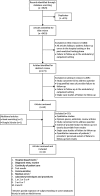The safety implications of missed test results for hospitalised patients: a systematic review
- PMID: 21300992
- PMCID: PMC3038104
- DOI: 10.1136/bmjqs.2010.044339
The safety implications of missed test results for hospitalised patients: a systematic review
Abstract
Background: Failure to follow-up test results is a critical safety issue. The objective was to systematically review evidence quantifying the extent of failure to follow-up test results and the impact on patient outcomes.
Methods: The authors searched Medline, CINAHL, Embase, Inspec and the Cochrane Database from 1990 to March 2010 for English-language articles which quantified the proportion of diagnostic tests not followed up for hospital patients. Four reviewers independently reviewed titles, abstracts and articles for inclusion.
Results: Twelve studies met the inclusion criteria and demonstrated a wide variation in the extent of the problem and the impact on patient outcomes. A lack of follow-up of test results for inpatients ranged from 20.04% to 61.6% and for patients treated in the emergency department ranged from 1.0% to 75% when calculated as a proportion of tests. Two areas where problems were particularly evident were: critical test results and results for patients moving across healthcare settings. Systems used to manage follow-up of test results were varied and included paper-based, electronic and hybrid paper-and-electronic systems. Evidence of the effectiveness of electronic test management systems was limited.
Conclusions: Failure to follow up test results for hospital patients is a substantial problem. Evidence of the negative impacts for patients when important results are not actioned, matched with advances in the functionality of clinical information systems, presents a convincing case for the need to explore solutions. These should include interventions such as on-line endorsement of results.
Conflict of interest statement
Figures
Comment in
-
Safety implications of missed test results for hospitalised patients: the use of electronic discharge summary systems.BMJ Qual Saf. 2011 Aug;20(8):733; author reply 733-4. doi: 10.1136/bmjqs-2011-000195. BMJ Qual Saf. 2011. PMID: 21778518 No abstract available.
References
-
- World Alliance for Patient Safety Summary of the Evidence on Patient Safety: Implications for Research. Geneva: World Health Organization, 2008
-
- Bates DW, Leape LL. Doing better with critical test results. Jt Comm J Qual Patient Saf 2005;31:66–7 - PubMed
-
- Roy CL, Poon EG, Karson AS, et al. Improving patient care. Patient safety concerns arising from test results that return after hospital discharge. Ann Intern Med 2005;143:121–8 - PubMed
-
- Cram P, Rosenthal GE, Ohsfeldt R, et al. Failure to recognize and act on abnormal test results: the case of screening bone densitometry. Jt Comm J Qual Patient Saf 2005;31:90–7 - PubMed
-
- Gandhi TK. Fumbled handoffs: one dropped ball after another. Ann Intern Med 2005;142:352–8 - PubMed
Publication types
MeSH terms
LinkOut - more resources
Full Text Sources
Medical
Miscellaneous

